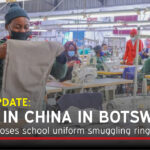Sitting at home and growing increasingly frustrated at her lack of opportunities, unemployed graduate, Nancy Changu Thibatsela took her destiny firmly into her own hands.
Inspired by her mother, who ordered hats from South Africa to sell locally, the 28-year-old Nswazwi native decided to take the venture one step further.
She attended a two-day hat-making course in Cape Town in 2017 and has not looked back since.
In November 2018, after months of pain staking research and long hours spent perfecting her craft, Thibatsela founded HeadGear Millinary.
Based in Francistown, the business provides hats of all shapes, sizes, incredible colours and intricate designs.
As well as Thibatsela and her mum, the venture includes two other employees.
Exactly a year in existence and the enterprise has already secured a deal to supply The Old Apostolic Church throughout Botswana.
Their hats are mostly for women who want fashionable, handcrafted, original designs for church, weddings and special occasions.
“When people first see them, they say, wow, how is that made? To make a hat I use sinamay, a material obtained from the palm of a banana tree. Sinamay is a Philippines word. I also use beads, flowers, duck feathers, quills and stretching laces,” revealed the ever smiling Thibatsela, adding that despite the complex designs and patterns it takes her about two hours to complete a hat.
Having finished her Form Five in 2010, Thibatsela enrolled on a Tourism and Hospitality course at ABM College.
However, after graduation, jobs proved hard to come by.
Desperate to earn a decent living, the ambitious young lady tapped into her mother’s passion for hats.
“I developed interest in knowing how they are made and I told myself I can do this, my mother, Sebongile Precious Thibatsela, does not have to buy from South Africa anymore. My parents were very supportive to my idea.
“They took me to Cape Town for a course. They paid P35, 000 for the course including transport, accommodation and meals. My mother is also part of HeadGear Millinary business and she no longer sells stock from abroad.”
Thibatsela produces three types of hats: fascinators, hatnators and full hats.
“A fascinator is a small hat with a flower while a hatnator is sort of a fascinator but does not cover the whole head. The last type is a full hat covering the whole head with a flower,” she explained.
“I have many designs but can incorporate any desired details that a customer wants,” continued Thibatsela, adding she accommodates three types of clients.

“People with low income that want a unique look and middle income people with medium earnings to spend but still want something to stand out and be special.
The last customer is the one with much money to spend and can order any hat they want!”
Thibatsela believes that as well as the quality of her products, the secret to her success is her excellent customer service
“A customer can return a hat five times saying change here and I do with a smile so they can always come back for more hats.
“My prices range from P65 to P1, 000 for the biggest hats,” she told Voice Money, noting that in a busy month she can earn up to P40, 000.
When quizzed on the challenges she faces, Thibatsela’s smile fades for the first time since the interview began.
“Some people take my products on credit and then take time to pay. And since I buy my materials in South Africa my business was affected during the Xenophobic riots. I had to stay for two weeks without material.”
Nevertheless, business remains ‘good’ and Thibatsela is upbeat about the future.
She plans to eventually open up her own manufacturing factory as well as giving back to the community by teaching locals how to make hats.















